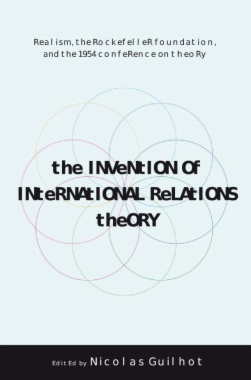The 1954 Conference on Theory, sponsored by the Rockefeller Foundation, featured a who's who of scholars and practitioners debating the foundations of international relations theory. Assembling his own team of experts, all of whom have struggled with this legacy, Nicolas Guilhot revisits a seminal event and its odd rejection of scientific rationalism.
Far from being a spontaneous development, these essays argue, the emergence of a "realist" approach to international politics, later codified at the conference, was deliberately triggered by the Rockefeller Foundation. The organization was an early advocate of scholars who opposed the idea of a "science" of politics, pursuing, for the sake of disciplinary autonomy, a vision of politics as a prerational and existential dimension that could not be "solved" by scientific means. As a result, this nascent theory was more a rejection of behavioral social science than the birth of one of its specialized branches. The archived conversations reproduced here, along with unpublished papers by Hans Morgenthau, Reinhold Niebuhr, and Paul Nitze, speak to this defensive stance. International relations theory is critically linked to the context of postwar liberalism, and the contributors explore how these origins have played out in political thought and American foreign policy.
- CONTENTS
- ACKNOWLEDGMENTS
- INTRODUCTION: ONE DISCIPLINE, MANY HISTORIES
- 1. MORALITY, POLICY, AND THEORY: Reflections on the 1954 Conference -Robert Jervis
- 2. TENSIONS WITHIN REALISM:1954 AND AFTER -Jack Snyder
- 3.THE ROCKEFELLER FOUNDATION CONFERENCE AND THE LONG ROAD TO ATHEORY OF INTERNATIONAL POLITICS -Brian C. Schmidt
- 4.THE SPEECH ACT OF REALISM: The Move That Made IR -Ole Wæver
- 5. THE REALIST GAMBIT: Postwar American Political Science and the Birth of IR Theory -Nicolas Guilhot
- 6. KENNAN: REALISM AS DESIRE -Anders Stephanson
- 7. AMERICAN HEGEMONY, THE ROCKEFELLER FOUNDATION, AND THE RISE OF ACADEMIC INTERNATIONAL RELATIONS IN THE UNITED STATES -Inderjeet Parmar
- 8. REALISM AND NEOLIBERALISM: From Reactionary Modernism to Postwar Conservatism -Philip Mirowsk
- APPENDIX1: CONFERENCE ON INTERNATIONAL POLITICS,MAY 7-8, 1954
- APPENDIX 2 THE THEORETICAL AND PRACTICAL IMPORTANCE OFA THEORY OF INTERNATIONAL RELATION -Shans j. morgenthau
- APPENDIX 3: THE MORAL ISSUE ININTERNATIONAL RELATIONS -Reinhold Niebuhr
- APPENDIX 4: INTERNATIONAL RELATIONS THEORY ANDAREAS OF CHOICE IN FOREIGN POLICY -William T. R. Fox
- APPENDIX 5:THE IMPLICATIONS OF THEORY FORPRACTICE IN THE CONDUCT OFFOREIGN AFFAIRS -Paul Nitze
- APPENDIX 6: THEORY OF INTERNATIONAL POLITICS:ITS MERITS AND ADVANCEMENT -Arnold Wolfers
- CONTRIBUTORS
- INDEX

